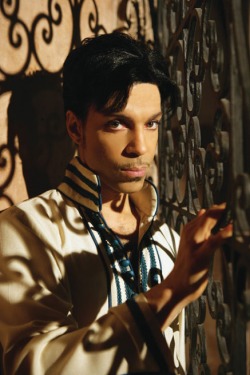Prince on American Bandstand - 1980
Prince was 19 years old when he wowed Dick Clark on American Bandstand. This is a clip of Prince being interviewed by Dick Clark between performing two songs off of his self-titled album "Prince". He performed "I Wanna Be Your Lover" and "Why You Wanna Treat Me So Bad?" on the show.
|
|
1978-Present

Prince Picture 1
Even though this album only received mediocre attention Prince caught a break and started his rise to stardom with his first Platinum album, "Dirty Minds". Released in October of 1980 this album really sealed the deal on Prince being a controversial figure with his sexually explicit lyrics, provocative attire, and his actions on stage. However, once Prince launched "1999" on October 28,1982 he fully embraced the widespread recognition he had long been awaiting ever since he was in Grand Central. WIth popular songs like "Little Red Corvette" and "Delirious" that were both on the top 10 Billboard of Pop Singles, "1999" became certified as Platinum three times(Prince Biography). Boosting Prince's status to the top, especially when his music video for "Little Red Corvette" emerged onto MTV.
In 1984 Prince earned two nominations for Favorite Soul/R&B Male Artist and Favorite Soul/R&B Album categories at the American Music Awards and even better his first Grammy Award nomination for Best R&B Male Vocal Performance for his track, "International Lover"(Prince Biography). Furthermore, his success became constant throughout the year with the soundtrack album of "Purple Rain". The two tracks that reached the #1 Billboard Hot 100 songs were "When Doves Cry" and "Let's Go Crazy" and eventually became Platinum 13 times over, further establishing Prince as one of the influential artists of the 1980s(Prince Biography). At one point in 1984, Prince simultaneously had the number one album, single, and film in the U.S.; it was the first tim a singer had achieved this feat(Gulla).Even more, Prince won 3 out of 10 American Award nominations and 2 Grammy Awards in 1985 for the soundtrack and also took home an Oscar for Best Original Song Score at the 57th Academy Awards.
As for the rest of the 1980s, Prince continuously created successful songs left and right such as, "Around the World in a Day" (1985), "Parade" (1986), "Sign 'O' The Times" (1987), "Lovesexy" (1988) and "Batman" soundtrack (1989), receiving an additional 5 Grammy nominations. By early 1990 the 5 nominations quickly turned into 9 for Prince's outstanding work in the "Batman" soundtrack which secured the number one spot on The Billboard 200(Prince Biography).
With all of Prince's success, he started to have conflicts with Warner Brothers Records, evident with the album of "Gold Experience" ready in 1994 but wasn't released until 1995. Fueling the fire in which who had the say over the artistic and financial control of Prince's work. Over this debacle, Prince changed his name to a symbol, O(+>, which was referred to as the artist previously known as Prince or TAFKAP. Soon after Prince made an appearance with "slave" written on his cheek to remind people of his opinion that he was a pawn in the record company's game to produce more money for themselves. At the end of his contract with Warner Brothers Records, he released his final album with them called "Chaos and Disorder" in July 1996.
In 1984 Prince earned two nominations for Favorite Soul/R&B Male Artist and Favorite Soul/R&B Album categories at the American Music Awards and even better his first Grammy Award nomination for Best R&B Male Vocal Performance for his track, "International Lover"(Prince Biography). Furthermore, his success became constant throughout the year with the soundtrack album of "Purple Rain". The two tracks that reached the #1 Billboard Hot 100 songs were "When Doves Cry" and "Let's Go Crazy" and eventually became Platinum 13 times over, further establishing Prince as one of the influential artists of the 1980s(Prince Biography). At one point in 1984, Prince simultaneously had the number one album, single, and film in the U.S.; it was the first tim a singer had achieved this feat(Gulla).Even more, Prince won 3 out of 10 American Award nominations and 2 Grammy Awards in 1985 for the soundtrack and also took home an Oscar for Best Original Song Score at the 57th Academy Awards.
As for the rest of the 1980s, Prince continuously created successful songs left and right such as, "Around the World in a Day" (1985), "Parade" (1986), "Sign 'O' The Times" (1987), "Lovesexy" (1988) and "Batman" soundtrack (1989), receiving an additional 5 Grammy nominations. By early 1990 the 5 nominations quickly turned into 9 for Prince's outstanding work in the "Batman" soundtrack which secured the number one spot on The Billboard 200(Prince Biography).
With all of Prince's success, he started to have conflicts with Warner Brothers Records, evident with the album of "Gold Experience" ready in 1994 but wasn't released until 1995. Fueling the fire in which who had the say over the artistic and financial control of Prince's work. Over this debacle, Prince changed his name to a symbol, O(+>, which was referred to as the artist previously known as Prince or TAFKAP. Soon after Prince made an appearance with "slave" written on his cheek to remind people of his opinion that he was a pawn in the record company's game to produce more money for themselves. At the end of his contract with Warner Brothers Records, he released his final album with them called "Chaos and Disorder" in July 1996.
